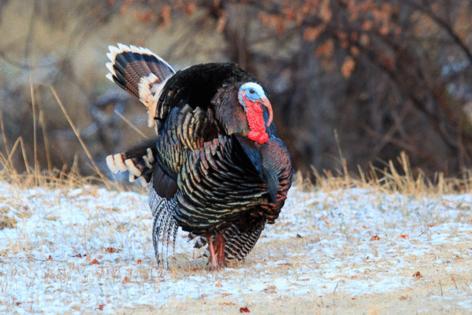Commentary: 'ThanksVegan' -- A table where everyone survives
Published in Op Eds
Every November, many of us gather around the table to pass mounds of mashed potatoes and catch up on health, house projects and happy news.
If we’re lucky, the young people will put down their devices. And if we’re extra lucky, Drunk Uncle won’t bring up politics. But with the recent government shutdown—and the party divide stronger than ever—will any family be able to survive a meal? This year, I hope Americans can find kindness at the table, starting with the ones who truly won’t survive: turkeys.
I used to spend Thanksgiving with my Southern cousins, whose house sat beside a golden cornfield. One year, a chorus of gobbles rose from the stalks, and there they were—a flock of wild turkeys. I froze. They were bigger than I’d imagined, regal in their slow, deliberate stride. There I was, meeting turkeys for the first time—while another lay dead on the table inside.
The irony wasn’t lost on me.
Since then, I learned that, much like humans, turkeys are social beings. They sleep in trees to stay safe and close to one another, keeping a close watch on their flocks. When they wake up in the morning, one of them starts a roll call. And when someone goes missing, the others call out until everyone is accounted for. This makes me wonder: Were they looking for someone in the cornfield that day?
When I lose sight of my child in public for even a moment, dread tightens my chest—until a rush of relief floods in when my eyes find them again. Similarly, when baby turkeys become separated from their mother, they call out for her, then flap their wings and run to her in joy the moment she answers.
Baby turkeys stay close to their mamas, who fiercely defend them from danger. Human mothers know that instinct, too. We often call it “mama lion”—but we could just as easily call it “mama turkey.” And when baby turkeys need warmth, their mother opens her wings so they can huddle beneath them. It reminds me of those moments that many human mothers know: standing with your body half out in the rain so your child can hold the umbrella.
Turkeys enjoy spending time with kindhearted humans, too. At some sanctuaries, rescued birds rush to greet guests, trill cheerful turkey songs and sometimes fall asleep in their laps.
My mentor, Jen, shared a story from her days interning at an animal sanctuary. She bonded with a turkey named Fern, who insisted that she be petted. She purred exactly like a cat. When Jen would stop, Fern would look over her shoulder as if to say, “Excuse me. More, please!”
The story for most turkeys, though, doesn’t end in the arms of a kind woman at a sanctuary. In the animal agriculture industry, farmers cram tens of thousands of turkeys into windowless sheds, denying them room to move or breathe fresh air. Workers cut their beaks, their bodies collapse under unnatural weight and slaughterhouses bring their short, sad lives to an end.
Knowing what I know about turkeys, I can’t help but wonder: How can a holiday about gratitude coexist with so much suffering? Perhaps the answer lies in rethinking what Thanksgiving means. What if gratitude means honoring life in all its forms? What if we created a table where compassion is the main course? What if we renamed the holiday “ThanksVegan”?
Choosing ThanksVegan is a celebration of gratitude, abundance and life—every plate full, every life spared.
So this year, when your grandpa brings up his favorite conspiracy, take a breath. Listen. Pass the Tofurky. Let’s make this ThanksVegan a celebration big enough for everyone—regardless of species.
____
Rebecca Libauskas is a staff writer for the PETA Foundation, 501 Front St., Norfolk, VA 23510; www.PETA.org.
___
©2025 Tribune Content Agency, LLC.
























































Comments